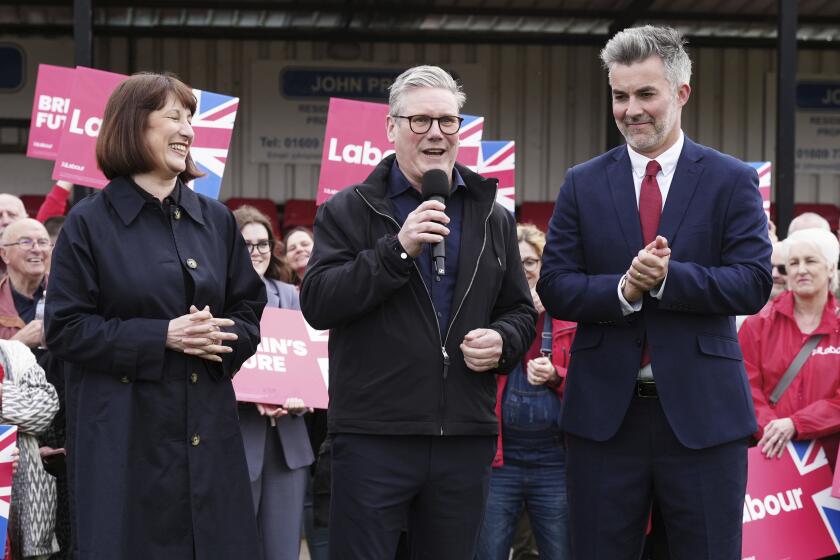Seeking a bridge to change in Egypt
He was barely a teenager when he joined the Muslim Brotherhood. Then in college he embraced communism and “tried to convince myself I was an atheist.” Finally, after two decades of struggling with his beliefs, he returned to his Islamic roots.
Today, at 68, Abdel Wahab Messiri may be uniquely qualified to create something that would shake the country’s political system: a genuine alliance between the ascendant but small leftist opposition and the Muslim Brotherhood, the country’s most powerful Islamic group.
A testament to ideological differences, personal mistrust and decades of government divide-and-conquer tactics, the chasm separating Egypt’s leftist and Islamist opposition is vast. Messiri, one of the country’s most celebrated intellectuals, is one of the few public figures with respect and credibility on both sides.
Messiri is the new leader and public face of the Kifaya (Enough) movement. His task: revitalizing the broad independent coalition that burst onto the scene in 2005 with a series of raucous, taboo-smashing demonstrations.
“I might be able to help. We’ll see what we can do,” he said. “I have a certain legitimacy among all political groups. I’m not looking for fame because I’m already famous. I have no political ambitions.”
‘The stage is ripe’
The author, best known for a massive encyclopedia of Judaism and Zionism that Israel has labeled anti-Semitic, is frail these days. His posture is hunched, and his steps have been made tentative by age and illness. But his mind remains sharp -- he speaks with an intellectual flourish as if each sentence should be recorded for posterity.
Messiri hopes his legacy will be of creating a unified front combining the banned Brotherhood’s grass-roots power with Kifaya’s big-tent inclusiveness.
“It is essential that the opposition forms one front so the government will get the message,” Messiri said. “The stage is ripe.... The public anger is very real, and the current levels of corruption are unprecedented in Egyptian history.”
Egypt’s long-standing leftist-Islamist gap is a symptom of each side’s Cairo-based leadership, he said. Out in the countryside, the two groups already cooperate and overlap without problems.
“You go to Benha and you find that opposition meetings have Muslim Brothers, Marxists, liberals,” he said, referring to the Nile Delta city. “They know each other.... They have trust in each other. They don’t have private agendas.”
But the mutual distrust among the leadership is deep-seated and the obstacles to such a union are formidable.
“Messiri is perfect for this point in Kifaya. Nobody else has this consensus on all sides,” said Manar Shorbagy, a political science professor at the American University in Cairo. “But the Brotherhood have proved throughout the years that they’re not willing.”
The Brotherhood and Kifaya are retrenching after a strong show of strength by the government -- forcing through a widely decried set of constitutional amendments in a March 26 referendum. The vote was criticized by international observers, and all opposition groups boycotted it.
Many here are predicting a dormant season for the opposition. But whatever movement emerges down the line could be largely shaped by Messiri’s influence.
“He can play a very positive role,” said Kamal Khalil, a veteran leftist activist and founding Kifaya member. “The Brotherhood can’t do it on their own. Some of their leaders understand that ... we can protect them and they can protect us.”
The appearance of Kifaya in December 2004 helped revitalize the leftist opposition. An umbrella group encompassing hard-core communists, moderate secularists and independent Islamists such as Messiri, Kifaya’s protests crossed long-established “red lines,” criticizing President Hosni Mubarak by name and opposing long-rumored plans for the president’s son Gamal to succeed his father.
Muslim Brotherhood leaders largely kept Kifaya at arm’s length, often organizing their own, much larger, demonstrations a day before or after a planned Kifaya protest. Without the Brotherhood’s vast pool of committed cadres, Kifaya rallies remained limited to a few hundred devoted activists, easily bottled up by government riot police.
“We had hoped to go out in the streets with them,” Khalil said. “We went out alone, but our numbers were not large.”
Almost two years later, hard feelings linger.
Kifaya leaders complain about highhandedness among Brotherhood members. Capable of marshaling 10,000-strong peaceful protests, the Brotherhood, they say, regarded Kifaya as unworthy of their attention.
“They had a feeling of superiority, like they’re way up here and we’re this tiny thing,” said Aboul Ela Madi, a former Brotherhood member who has spent a decade trying to gain a government license to form the Wasat (Centrist) Party.
Some Brotherhood leaders retain an openly dim view of Kifaya.
Mohammed Habib, a member of the Brotherhood’s ruling 12-member Guidance Council, describes Kifaya as disorganized, ideologically splintered, unpopular and, ironically, undemocratic.
“They’re not accepted by or close to the people,” Habib said in an interview at the Brotherhood’s modest Nile-side headquarters. Kifaya’s leadership, he said, amounted to an elite cabal that “controlled the decisions and isolated itself from the rest of the members.”
Between two poles
Into these somewhat poisoned waters steps Messiri. Born in the Nile Delta city -- and Brotherhood stronghold -- of Damanhur, he joined the Brotherhood while he was in middle school and left it just a few years later as he turned to communism.
The transition between the two political poles was less drastic, he said, than it would be today.
“Both the Muslim Brotherhood and the communists were seekers for some sort of truth. At the time in Damanhur, they used to recruit from each other’s ranks,” Messiri said.
A 20-year internal struggle played out while attending graduate school in the United States, at Columbia University and Rutgers University, and later teaching in Saudi Arabia and Kuwait. He describes his transition back to Islam in the vocabulary of a true salon-bred intellectual.
“It was no longer possible for me to embrace materialistic paradigms to explain human nature,” he said. “I thought I was an atheist, but at the same time, what about my belief in absolute moral values? What about my belief in transcendence?”
Messiri is best known as the Arab world’s reigning expert on Judaism and Zionism, having written dozens of articles and books on the subject in addition to his 20-year-long encyclopedia project.
Israeli officials have long labeled Messiri an anti-Semite, and his views on Zionism and Israel in particular are certainly negative. But he also wrote a book debunking “The Protocols of the Elders of Zion,” a purported depiction of a global Jewish conspiracy regarded as genuine in much of the Muslim world.
Habib, the Muslim Brotherhood leader, acknowledges respect for Messiri. But even in praising him, he can’t resist a few extra digs at Kifaya.
“If he’s able to steer Kifaya into a democratic form, far from authoritarianism and dictatorship, [Messiri] may succeed in connecting with the Brotherhood,” he said.
Khalil, the founding Kifaya member, acknowledges that the creation of a genuine trust may take years, but said, “Any political alliance stands on personal relationships.... OK, so we didn’t create an alliance. But we’re taking positive steps.”
More to Read
Start your day right
Sign up for Essential California for news, features and recommendations from the L.A. Times and beyond in your inbox six days a week.
You may occasionally receive promotional content from the Los Angeles Times.






